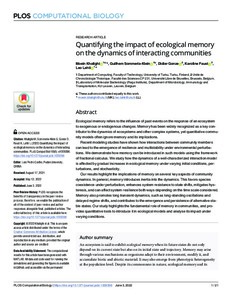Quantifying the impact of ecological memory on the dynamics of interacting communities
Khalighi Moein; Sommeria-Klein Guilhem; Gonze Didier; Faust Karoline; Lahti Leo
https://urn.fi/URN:NBN:fi-fe2022081154389
Tiivistelmä
Ecological memory refers to the influence of past events on the response of an ecosystem to exogenous or endogenous changes. Memory has been widely recognized as a key contributor to the dynamics of ecosystems and other complex systems, yet quantitative community models often ignore memory and its implications.
Recent modeling studies have shown how interactions between community members can lead to the emergence of resilience and multistability under environmental perturbations. We demonstrate how memory can be introduced in such models using the framework of fractional calculus. We study how the dynamics of a well-characterized interaction model is affected by gradual increases in ecological memory under varying initial conditions, perturbations, and stochasticity.
Our results highlight the implications of memory on several key aspects of community dynamics. In general, memory introduces inertia into the dynamics. This favors species coexistence under perturbation, enhances system resistance to state shifts, mitigates hysteresis, and can affect system resilience both ways depending on the time scale considered. Memory also promotes long transient dynamics, such as long-standing oscillations and delayed regime shifts, and contributes to the emergence and persistence of alternative stable states. Our study highlights the fundamental role of memory in communities, and provides quantitative tools to introduce it in ecological models and analyse its impact under varying conditions.
Kokoelmat
- Rinnakkaistallenteet [27094]
